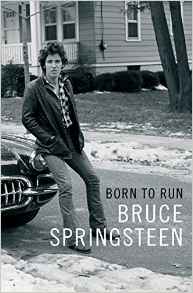 Bruce Springsteen, Born to Run (New York: Simon & Schuster, 2016), 528pp.
Bruce Springsteen, Born to Run (New York: Simon & Schuster, 2016), 528pp.
A review by David Werther.
Adele read romance novels, listened to hit songs on the radio, and worked as a legal secretary. Douglas, a bull of a man, suffered from mental illness, downed a six-pack of beer every night, and worked on an assembly line in a Ford Motor Plant. Adele was fiercely devoted to Douglas, who, succumbing to paranoia, would even so doubt her faithfulness and wonder if one of their son's friends was a Russian spy.
Adele encouraged their son's musical interests, helping him get his first guitar. Douglas was jealous of his son, and detested his long hair. When the boy lay in bed, recuperating from a motorcycle accident, the father took advantage of the opportunity and brought in a barber to cut off the offending locks. His son retaliated by telling his father for the first and only time that he hated him.
Suffering from mental illness like his father, in his case depression, Bruce Springsteen has no trouble channeling sadness through his music. And, thanks to the indomitable spirit he shares with his mother, he never lets sadness suffocate romance. Bruce believes that the best music combines both sadness and happiness.
Heartbreak and joy are not the only tensions Bruce Springsteen lives with. There is also the strain of feeling out of place both in the blue-collar world he grew up in, and in the 60s counterculture. The drug culture is no more acceptable to him than his hometown’s intolerance. A firm believer in the magic of a tight-knit band, Springsteen rejects musical democracy. He wants a great band but insists on being the boss, and so he is. The buck starts and stops with him.
And then there is the turbulent spiritual undercurrent. Bruce begins the last chapter of his autobiography with some lines from "My Father's House": “Calling and calling so cold and alone; Shining across this dark highway; Where our sins lie unatoned.” He then describes a visit to his old neighborhood, where words he once chanted in church come to mind, ”Our Father who art in heaven, hallowed be thy name… forgive us our trespasses as we forgive those who trespass against us… “ The juxtaposition of the fathers and the failings brings us back to some remarks Springsteen makes at the beginning of his memoir: “As funny as it sounds, I have a ‘personal’ relationship with Jesus. He remains one of my fathers, though as with my own father, I no longer believe in his godly power. I believe deeply in his love, his ability to save… but not to damn… “ (p. 17).
Springsteen notes that the search for redemption is a recurring theme in his work (p. 193). This quest, part of his backstory, helps set his autobiography apart from, and ahead of, a myriad of musical memoirs. I think it’s why we run with him and why in the best music, heartbreak never buries happiness.
We’re gonna get to that place
Where we really wanna go
And, we’ll walk in the sun
But ‘til then, tramps like us
Baby we were born to run. (“Born to Run”)


